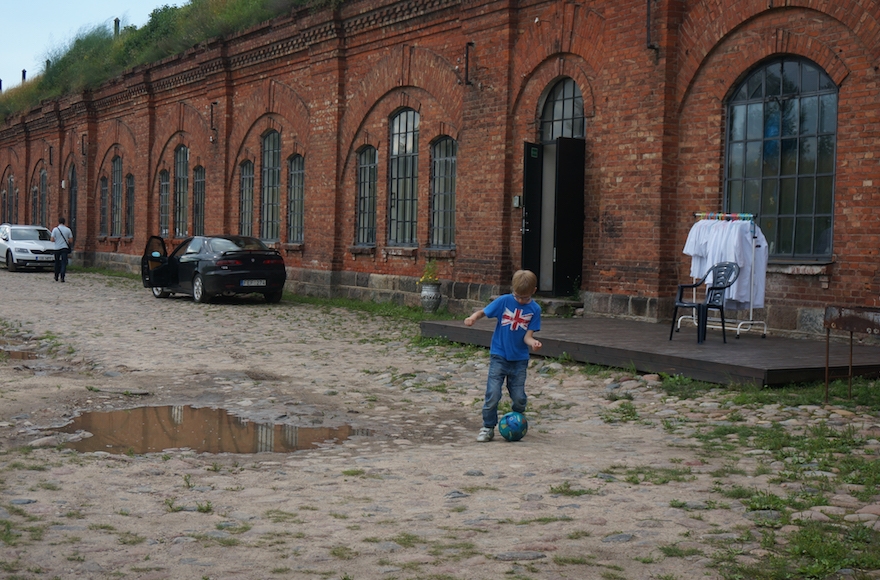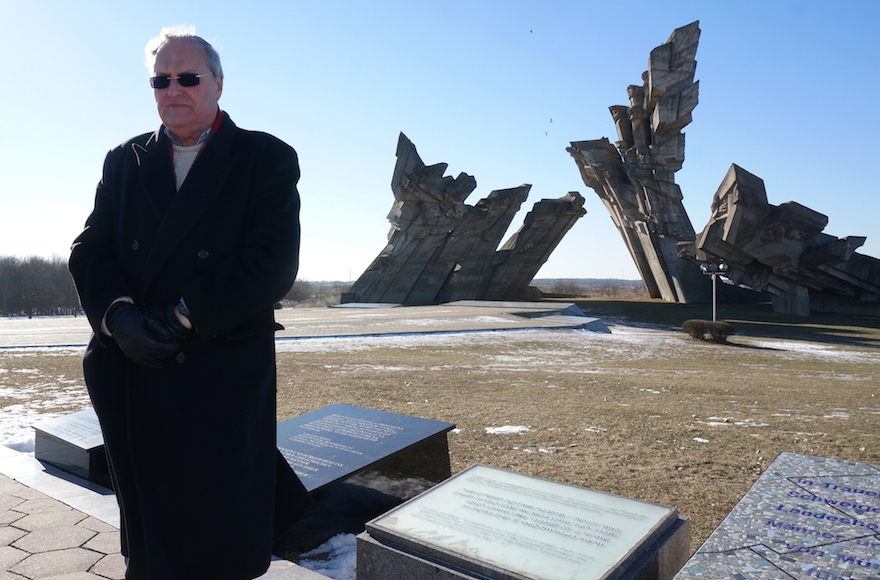
A boy playing soccer at the entrance to the former concentration camp known as the Seventh Fort in Kaunas, Lithuania, on July 12, 2016. (JTA/Cnaan Liphshiz)
(JTA) — A prominent Nazi-hunter from Israel and the Jewish Community of Lithuania called on the city of Kaunas to stop the use for recreational purposes of what used to be a concentration camp for Jews during the Holocaust.
Efraim Zuroff, the Israel director of the Simon Wiesenthal Center, on Tuesday wrote a letter about the area known as the Seventh Fort to Kaunas Mayor Visvaldas Matijosaitis. It follows the publication last month of a JTA expose about various activities held on the grounds, including treasure hunts, summer camps, costume parties for adults, camping excursions and BBQ parties.
The JTA article prompted critical articles in mainstream Lithuanian media and abroad, including by Britain’s Daily Mail.
“As you no doubt are aware, the site of the mass murder of several thousand Jews in 1941 was privatized several years ago, and has now been turned into a recreation and entertainment center which violates the memory of the victims,” wrote Zuroff, who conducted his own investigation of the site together with the Lithuanian novelist Ruta Vanagaite for a book they co-authored and published in January titled “Musiskiai,” Lithuanian for “our own.”
“I urge you to immediately suspend such activities at the Seventh Fort and find a way to restore the site to the municipality or to an organization whose purpose will be to honor the memory of the victims, rather than insult them,” added Zuroff, who provided a copy of the letter to JTA.
The city privatized the Seventh Fort in 2009, handing over the land to a nonprofit called Military Heritage Center, which is headed by a 37-year-old amateur historian and computer information expert, Vladimir Orlov.
Orlov told JTA that while many Jews are buried at the Seventh Fort, the mass graves account for two percent of the area. He said that recreational activities do not take place near or on the graves, which are largely unmarked except for a few poles, where relatives of the victims sometimes light candles in their memory.
According to “Musiskiai,” sometime after 2009 Orlov exhumed bones of Jews killed at the Seventh Fort, which were reburied in 2014. The Jewish Community of Lithuania in a July 26 statement said it made sure the reburial complied with Jewish religious laws, but added that Orlov’s NGO has not complied with their repeated appeals for plaques commemorating the dead.
Orlov said proceeds from events and tours that his staff of 11 give at the Seventh Fort go to maintenance work.
But the Jewish Community of Lithuania clearly is not convinced.
“The Lithuanian Jewish Community believes Lithuanian institutions must make sure the memory of the victims of the Holocaust doesn’t become subject to private business schemes,” read the community’s statement. “Unfortunately, the Seventh Fort, the first concentration camp in Lithuania, has become an notorious example of this sort of exploitation, despite constant calls by the Lithuanian Jewish Community.”
JTA has documented Jewish history in real-time for over a century. Keep our journalism strong by joining us in supporting independent, award-winning reporting.






